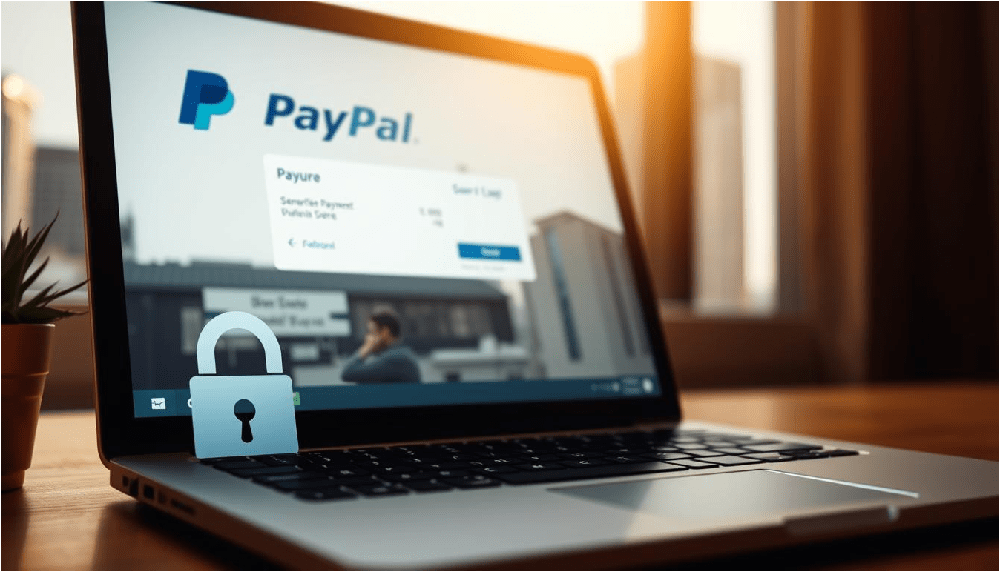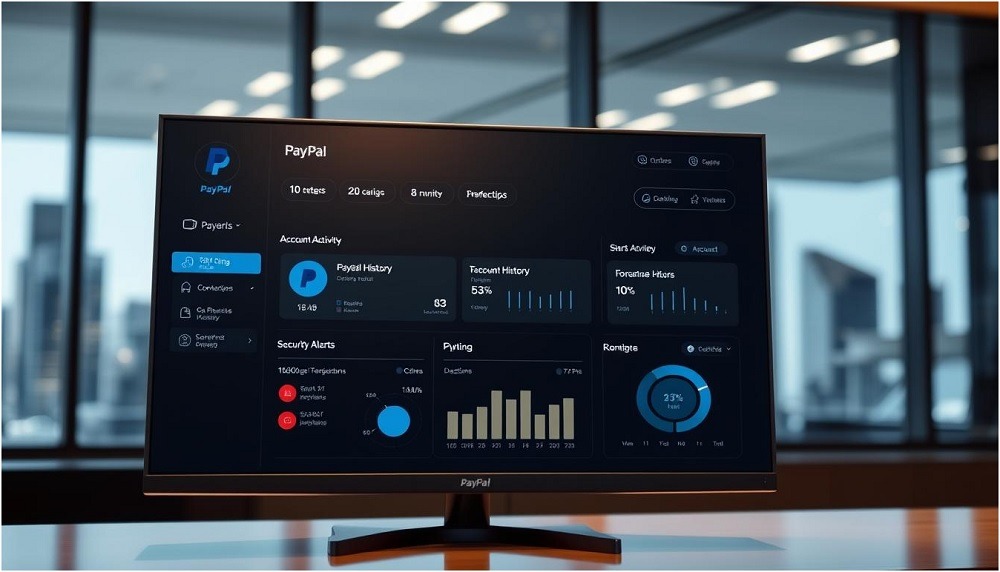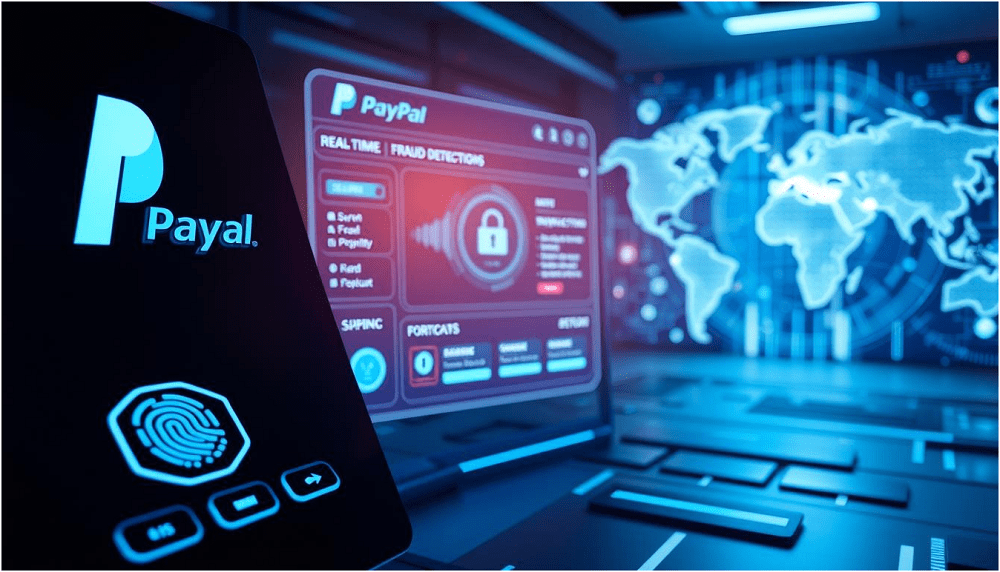PayPal is one of the most widely used online payment systems, and its security features are crucial in protecting users’ transactions. With robust security measures in place, PayPal provides a safe and seamless payment experience.

PayPal’s data protection features are designed to safeguard users’ sensitive information, ensuring that online transactions are secure and reliable.
Key Takeaways
- PayPal’s security features protect against unauthorized access and fraudulent activities.
- Robust security measures ensure the integrity of transactions.
- PayPal’s data protection features provide an additional layer of security for online payments.
- Secure online payments with PayPal are facilitated through its advanced security protocols.
- PayPal’s security features are regularly updated and improved to stay ahead of emerging threats.
The Evolution of PayPal’s Security Infrastructure
PayPal has made significant strides in bolstering its security features to ensure safe transactions. Over the years, the company has invested heavily in enhancing its security infrastructure to protect user data and prevent unauthorized access.
How PayPal Protects Your Financial Information
PayPal employs advanced technologies, including encryption and fraud detection systems, to safeguard financial information. By using end-to-end encryption, PayPal ensures that sensitive data is protected both in transit and at rest.
|
Security Feature |
Description |
Benefit |
|
End-to-End Encryption |
Protects data in transit and at rest |
Ensures confidentiality and integrity |
|
Fraud Detection Systems |
Monitors transactions for suspicious activity |
Prevents unauthorized transactions |
|
Two-Factor Authentication |
Adds an extra layer of security to login |
Reduces risk of account compromise |
PayPal’s Security Certifications and Compliance Standards
PayPal adheres to stringent security certifications and compliance standards, including PCI-DSS, to ensure the security of user data. Compliance with these standards demonstrates PayPal’s commitment to maintaining a secure environment for transactions.
Essential PayPal Security Features for All Users
To ensure safe and seamless payments, PayPal offers a range of essential security features that protect both buyers and sellers in transactions.
These features are designed to provide a secure environment for financial transactions, leveraging advanced technologies and robust protection programs.
Passkeys for Enhanced Security: PayPal now supports passkeys, allowing users to log in using biometric authentication like Face ID or fingerprint recognition, providing a more secure and convenient alternative to traditional passwords.
AI-Powered Fraud Detection: Leveraging artificial intelligence, PayPal monitors transactions in real-time to detect and prevent fraudulent activities, enhancing the overall security of user accounts.
End-to-End Encryption Technology
PayPal employs end-to-end encryption technology to safeguard financial information. This means that data is encrypted from the moment it is entered on a user’s device until it reaches PayPal’s servers, ensuring that sensitive information remains confidential and protected from unauthorized access.
By using advanced encryption protocols, PayPal ensures that transactions are secure and that personal data is not compromised.
Fraud Detection and Prevention Systems
PayPal’s fraud detection and prevention systems are sophisticated tools designed to identify and mitigate potential fraudulent activities. These systems monitor transactions in real-time, using machine learning algorithms to detect patterns that may indicate fraud.
By quickly identifying and responding to potential threats, PayPal’s systems help to prevent unauthorized transactions and protect users’ accounts.
Buyer and Seller Protection Programs
PayPal offers protection programs for both buyers and sellers, providing an additional layer of security for transactions. The Buyer Protection program covers eligible purchases, allowing buyers to file a claim if an item is not received or is significantly different from the seller’s description.
The Seller Protection program, on the other hand, protects sellers against unauthorized transactions and claims, helping to ensure that they receive payment for their goods and services.
Creating and Managing Strong PayPal Passwords
Securing your PayPal account begins with creating a strong password, a crucial step in protecting your financial information. A robust password acts as a significant barrier against unauthorized access, ensuring that your transactions and personal data remain secure.
Want to keep your PayPal app secure? Check out our Smartphone Security Guide to learn how to protect your device from hackers and identity theft.
Password Best Practices Specific to PayPal
To maximize security, PayPal recommends following specific password best practices. These include using a combination of uppercase and lowercase letters, numbers, and special characters. Avoid using easily guessable information such as your name, birthdate, or common words. It’s also advisable to change your password periodically and not reuse passwords across different accounts.
|
Password Characteristic |
Description |
Example |
|
Length |
Minimum of 8 characters |
At least 8 characters long |
|
Complexity |
Mix of uppercase, lowercase, numbers, and special characters |
G#8dLp$eJ |
|
Uniqueness |
Avoid using the same password across multiple sites |
Different passwords for PayPal and other accounts |
Using PayPal’s Password Management Tools
PayPal offers tools to help manage your password securely. You can use PayPal’s password generator to create a strong, unique password. Additionally, PayPal’s account settings allow you to enable two-factor authentication (2FA), adding an extra layer of security to your login process.
Secure Password Recovery Options
In case you forget your password, PayPal provides a secure password recovery process. This involves verifying your identity through email or phone number associated with your account. It’s essential to keep your recovery information up to date to ensure you can regain access to your account if needed.
PayPal Security Key and Mobile Authentication Methods
PayPal offers several security features to protect your account, including the PayPal Security Key and mobile authentication methods. These features provide an additional layer of security to your PayPal account.
How the PayPal Security Key Protects Your Account
The PayPal Security Key is a feature that adds an extra layer of security to your account. By using a security key, you can significantly reduce the risk of unauthorized access to your account.
Setting Up and Using Mobile Authentication
Mobile authentication is another security feature offered by PayPal. This method involves using your mobile device to authenticate your identity, providing an additional layer of security.
Troubleshooting Authentication Issues
If you encounter any issues with authentication, you can refer to PayPal’s support resources or contact their customer support for assistance.
Protecting Against Email Scams and Phishing Attempts
As a user of PayPal, it’s essential to be aware of the potential threats to your account security. Phishing attempts and email scams are becoming increasingly sophisticated, making it crucial to stay informed about the measures you can take to protect yourself.
Identifying Fraudulent PayPal Emails and Messages
To safeguard your PayPal account, it’s vital to be able to identify fraudulent emails and messages. Scammers often use convincing emails that appear to be from PayPal, attempting to trick you into divulging sensitive information.
PayPal’s Anti-Phishing Technologies
PayPal employs a range of anti-phishing technologies to safeguard its users. These technologies include email verification, machine learning models, and two-factor authentication (2FA) to add an extra layer of security to your account.
What to Do If You’ve Responded to a Phishing Attempt
If you’ve inadvertently responded to a phishing attempt or suspect that your account has been compromised, it’s essential to take immediate action. Contact PayPal’s customer support to report the incident and seek assistance in securing your account.
Secure Payment Methods Through PayPal’s Platform
With PayPal, users can enjoy a range of payment options that prioritize security and convenience. PayPal’s diverse payment methods are designed to protect users’ financial information while providing a seamless transaction experience.
One-Touch Payment Security
One-touch payments allow users to make transactions quickly without having to re-enter their payment information. This feature is secured through PayPal’s advanced encryption technology, ensuring that sensitive data is protected.
- Enhanced convenience without compromising security
- Reduced risk of data exposure
- Streamlined checkout process
PayPal Checkout Security Features
PayPal Checkout offers an additional layer of security for online transactions. By using PayPal Checkout, merchants can provide their customers with a secure payment environment that is protected by PayPal’s robust security measures.
Key security features include:
- Advanced fraud detection and prevention
- Zero-liability protection for eligible transactions
- Secure tokenization for payment information
QR Code and Contactless Payment Protection
PayPal also supports QR code and contactless payments, offering users a convenient and secure way to make transactions. These payment methods are protected by PayPal’s security protocols, including encryption and fraud monitoring.
By utilizing these secure payment methods through PayPal’s platform, users can enjoy a safe and seamless payment experience. Whether you’re shopping online or in-store, PayPal’s security features provide peace of mind.
Advanced PayPal Security Features for Business Accounts
For businesses, PayPal offers a suite of enhanced security features to protect against fraud and ensure secure transactions. These advanced measures are designed to safeguard business accounts and provide a secure environment for financial operations.
Fraud Protection Tools for Merchants
PayPal’s fraud protection tools are comprehensive, offering merchants protection against unauthorized transactions. These tools include advanced risk assessment algorithms and machine learning technologies to detect and prevent fraudulent activities.
Multi-User Access Controls and Permissions
Multi-user access controls allow businesses to manage user permissions effectively, ensuring that employees have appropriate access levels to account features and transaction capabilities. This granular control helps in minimizing the risk of internal fraud and misuse.
|
Feature |
Description |
Benefit |
|
Fraud Protection Tools |
Advanced algorithms and machine learning to detect fraud |
Protection against unauthorized transactions |
|
Multi-User Access Controls |
Granular control over user permissions |
Reduced risk of internal fraud and misuse |
|
Data Encryption and PCI Compliance |
End-to-end encryption and adherence to PCI standards |
Secure transactions and compliance with industry standards |
Data Encryption and PCI Compliance for Businesses
PayPal ensures that all transactions are secured through end-to-end encryption. Moreover, PayPal’s adherence to PCI (Payment Card Industry) compliance standards further enhances the security posture for businesses, protecting sensitive customer information.
By leveraging these advanced security features, businesses can significantly enhance their security and reduce the risk of fraud. PayPal’s comprehensive security measures provide a robust defense against various types of cyber threats and fraudulent activities.
Monitoring Your PayPal Account for Suspicious Activity
To ensure the security of your PayPal account, it’s crucial to regularly monitor your account activity for any suspicious transactions or login attempts. In this section, we will guide you on how to effectively review your transaction history, set up custom account alerts, and utilize the security dashboard provided by PayPal.
Setting Up Custom Account Alerts and Notifications
PayPal offers a feature to set up custom alerts and notifications for your account activity. By enabling these alerts, you can receive notifications about potential security threats, such as login attempts from unfamiliar locations or suspicious transactions. To set up these alerts, follow these steps:
- Log in to your PayPal account.
- Navigate to the “Settings” or “Profile” section.
- Look for the “Notifications” or “Alerts” tab.
- Enable the desired alerts and notifications according to your preferences.
Reviewing Transaction History Effectively
Regularly reviewing your transaction history is essential to identify any suspicious activity. To do this, follow these steps:
- Log in to your PayPal account.
- Navigate to the “Activity” or “Transaction History” section.
- Review the list of transactions, focusing on any unfamiliar or suspicious transactions.

Using the Security Dashboard
The PayPal security dashboard provides a comprehensive overview of your account’s security status. To access the security dashboard, follow these steps:
- Log in to your PayPal account.
- Navigate to the “Security” or “Settings” section.
- Look for the “Security Dashboard” or “Account Security” tab.
- Review the information provided, paying attention to any security warnings or alerts.
By following these guidelines, you can effectively monitor your PayPal account for suspicious activity and maintain a secure online payment experience. For more information on PayPal’s security features and how to secure your account, you can refer to the relevant sections within the PayPal website or consult with PayPal’s customer support.
has been omitted for brevity, as per the instructions. The content is enclosed within the tag as required.
What to Do If Your PayPal Account Is Compromised
If your PayPal account is compromised, it’s essential to take immediate action to secure your account and prevent further unauthorized transactions. Here’s a step-by-step guide to help you recover your account and protect your financial information.
Immediate Steps to Secure Your Account
To secure your PayPal account, follow these steps:
- Change your password immediately to prevent further unauthorized access.
- Enable two-factor authentication (2FA) to add an extra layer of security to your account.
- Review your account activity and transaction history to identify any suspicious or unauthorized transactions.
Reporting Unauthorized Transactions to PayPal
If you’ve identified unauthorized transactions or suspicious activity in your account, report them to PayPal immediately. You can do this by:
- Filing a complaint through the PayPal Resolution Center.
- Contacting PayPal customer support directly.
Account Recovery Process and Timeline
The account recovery process typically involves the following steps:
- PayPal will investigate the reported incident and may request additional information from you.
- Once the investigation is complete, PayPal will take necessary actions to secure your account and prevent further unauthorized access.
- You may be required to provide additional information or documentation to facilitate the recovery process.
By following these steps, you can effectively recover your compromised PayPal account and protect your financial information from potential threats.
Latest Innovations in PayPal Security Features
As technology evolves, PayPal remains at the forefront of security innovations, safeguarding user transactions. The company continually updates its security infrastructure to address emerging threats and enhance user protection.
Biometric Authentication Enhancements
PayPal has introduced advanced biometric authentication methods, including facial recognition and fingerprint scanning, to provide an additional layer of security. These enhancements make it more difficult for unauthorized users to access accounts.
AI-Powered Fraud Detection Updates
PayPal’s AI-powered fraud detection systems have been updated to more effectively identify and prevent fraudulent activities. These systems analyze transaction patterns and user behavior to detect potential threats in real-time.
Upcoming Security Features in Development
PayPal is working on several new security features, including enhanced encryption protocols and more robust two-factor authentication methods. These upcoming features aim to further bolster the security of user transactions.
|
Security Feature |
Description |
Benefits |
|
Biometric Authentication |
Uses facial recognition and fingerprint scanning for secure login |
Enhanced security, reduced risk of unauthorized access |
|
AI-Powered Fraud Detection |
Analyzes transaction patterns to detect fraud |
Real-time threat detection, improved transaction security |
|
Enhanced Encryption |
Advanced encryption protocols for secure data transmission |
Increased protection of user data |
Conclusion: Maximizing Your Protection with PayPal
As we’ve explored throughout this article, PayPal offers a robust set of security features designed to safeguard your financial information and ensure secure online payments. By understanding and utilizing these features, you can significantly enhance your protection against potential threats.
To maximize your paypal account security, it’s essential to implement strong passwords, enable two-factor authentication, and regularly monitor your account activity. By taking these steps, you can effectively protect your PayPal account from unauthorized access.
PayPal’s commitment to security is evident in its advanced technologies, including end-to-end encryption, fraud detection systems, and buyer and seller protection programs. By leveraging these features, you can enjoy a secure online payment experience with PayPal.
To further enhance your security, stay informed about the latest innovations in PayPal’s security features, such as biometric authentication and AI-powered fraud detection. By staying up-to-date and following best practices for securing your account, you can confidently use PayPal for your online transactions, knowing that you’re protected with industry-leading security measures.
FAQ
Q1: What are the top security features offered by PayPal?
PayPal offers a range of security features, including end-to-end encryption, two-factor authentication, and fraud detection systems, to ensure safe and secure transactions.
Q2: How does PayPal protect my financial information?
PayPal protects your financial information through robust security measures, including encryption and secure servers, to safeguard your data and transactions.
Q3: What is two-factor authentication, and how does it enhance security?
Two-factor authentication is a security process that requires you to provide two different authentication factors in addition to your password, making it more difficult for attackers to gain unauthorized access to your account.
Q4: How can I enable two-factor authentication on my PayPal account?
To enable two-factor authentication on your PayPal account, go to the security settings section of your account, and follow the prompts to set up 2FA, which may involve receiving a verification code via SMS or authenticator app.
Q5: What are the benefits of using a PayPal Security Key?
A PayPal Security Key provides an additional layer of security by requiring a physical token or a biometric authentication method, making it more challenging for attackers to access your account.
Q6: How do I identify and avoid phishing attempts targeting PayPal users?
To avoid phishing attempts, be cautious of emails or messages that ask for sensitive information, and verify the authenticity of any communication from PayPal or other sources.
Q7: What should I do if I’ve fallen victim to a phishing scam or account compromise?
If you’ve fallen victim to a phishing scam or account compromise, immediately change your password, enable two-factor authentication if not already enabled, and contact PayPal’s customer support to report the incident.
Q8: Are there any additional security measures I can take to protect my PayPal account?
Yes, consider using a password manager, keep your account and browser up to date, and be cautious when clicking on links or providing sensitive information online.
Q9: How can merchants and businesses enhance their PayPal security?
Merchants and businesses can enhance their PayPal security by utilizing PayPal’s business security features, such as multi-user access controls, and ensuring PCI compliance for their transactions.
Q10: What are the latest innovations in PayPal security features?
The latest innovations include biometric authentication enhancements, AI-powered fraud detection updates, and upcoming security features in development, such as advanced encryption methods and improved 2FA.
















